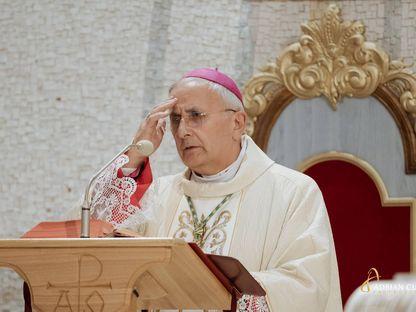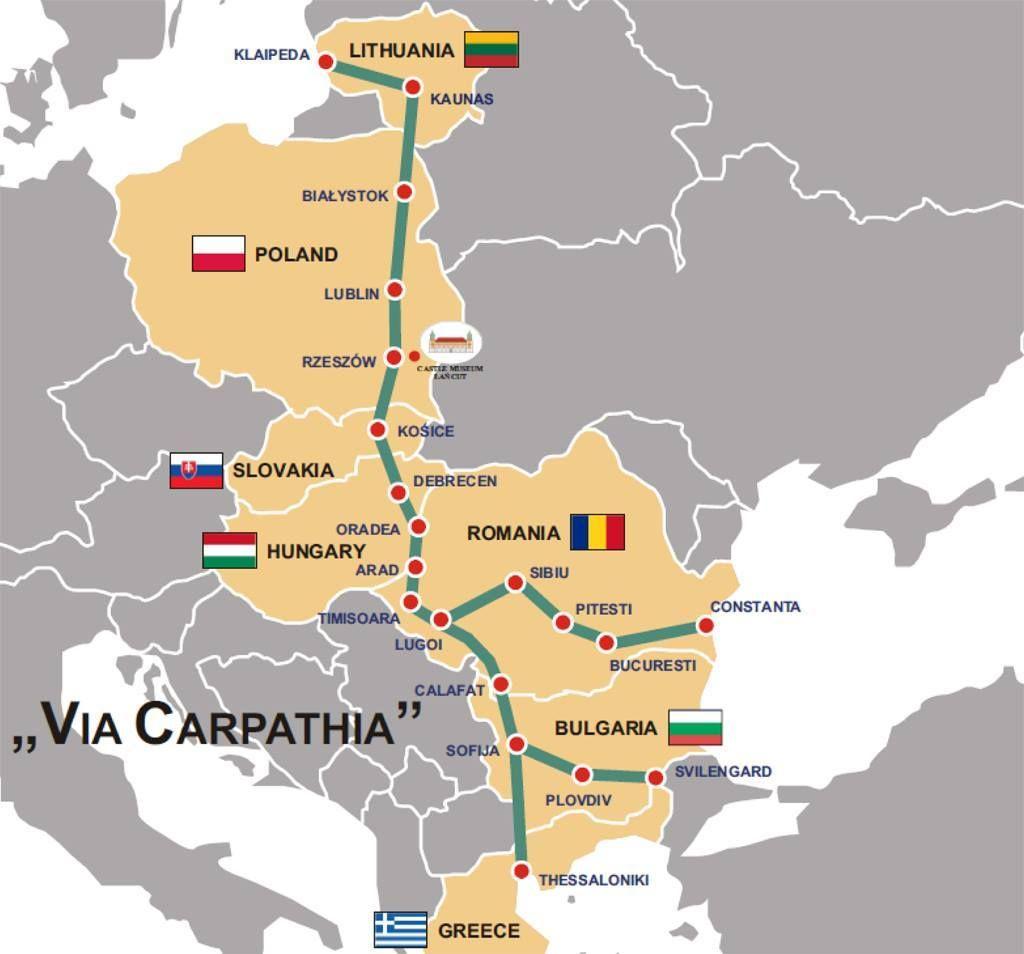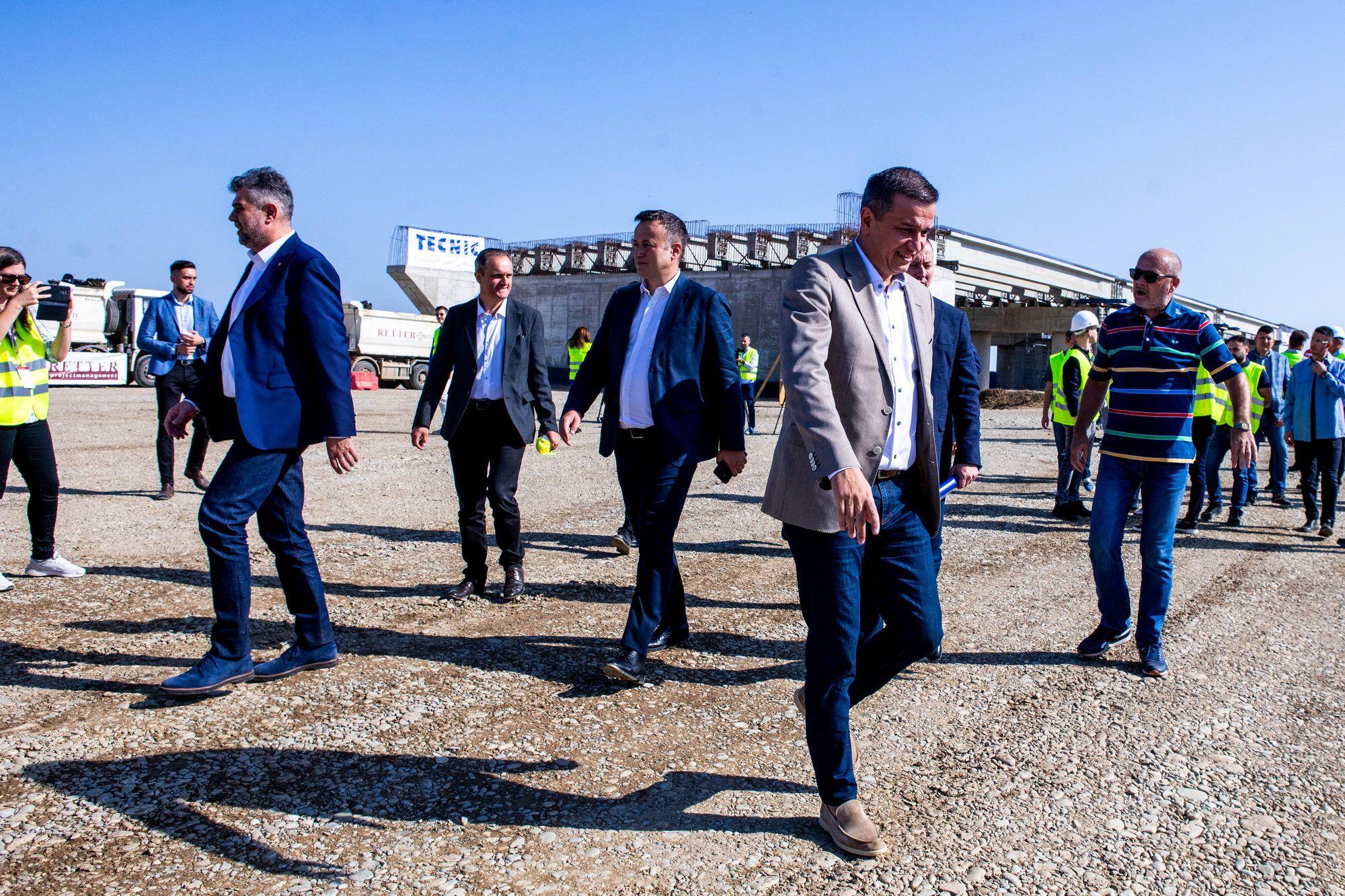
Romania's contradictory strategies regarding the acceptance of Turkish companies in large infrastructure projects have a pronounced geopolitical explanation. Photo: Inquam Photos / Ovidiu Micsik
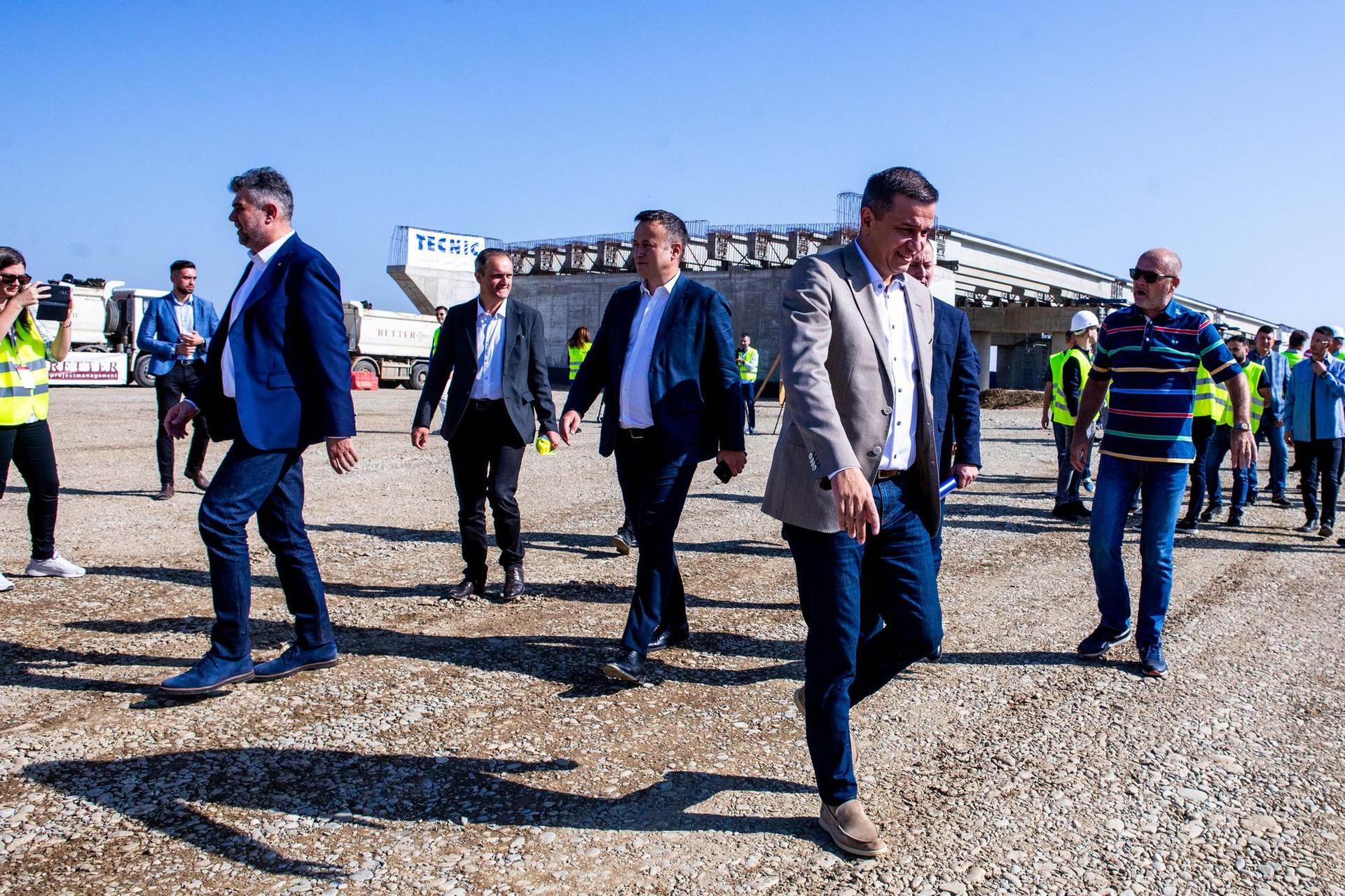
Romania's contradictory strategies regarding the acceptance of Turkish companies in large infrastructure projects have a pronounced geopolitical explanation. Photo: Inquam Photos / Ovidiu Micsik
"The Gang of Five". How President Erdogan is building his influence in Romania and the world through construction companies loyal to the regime
English Section
02/12/2023
"All thanks to you, high authority", the CEO of the Kalyon Group was saying to Turkish President Recep Tayyip Erdoğan Erdogan in September 2020.
Cemal Kalyoncu was actually talking to a huge screen projecting the image of the Turkish president, but his reasons for bowing to Cumhurbașkanı (the president of the republic, editor's note) were as valid as they can be: under the current head of state, in power since 2014, construction companies have gained billions of dollars and access to international markets. The Turks' main gateway to Europe is Romania.
Today, three years later, Cengiz, Limak, Kalyon, Kolin and Makyol, known as the "The Gang of Five" and other satellite firms, are building Turkey's mega infrastructure projects: the new Istanbul airport and a waterway with major environmental and geopolitical implications.
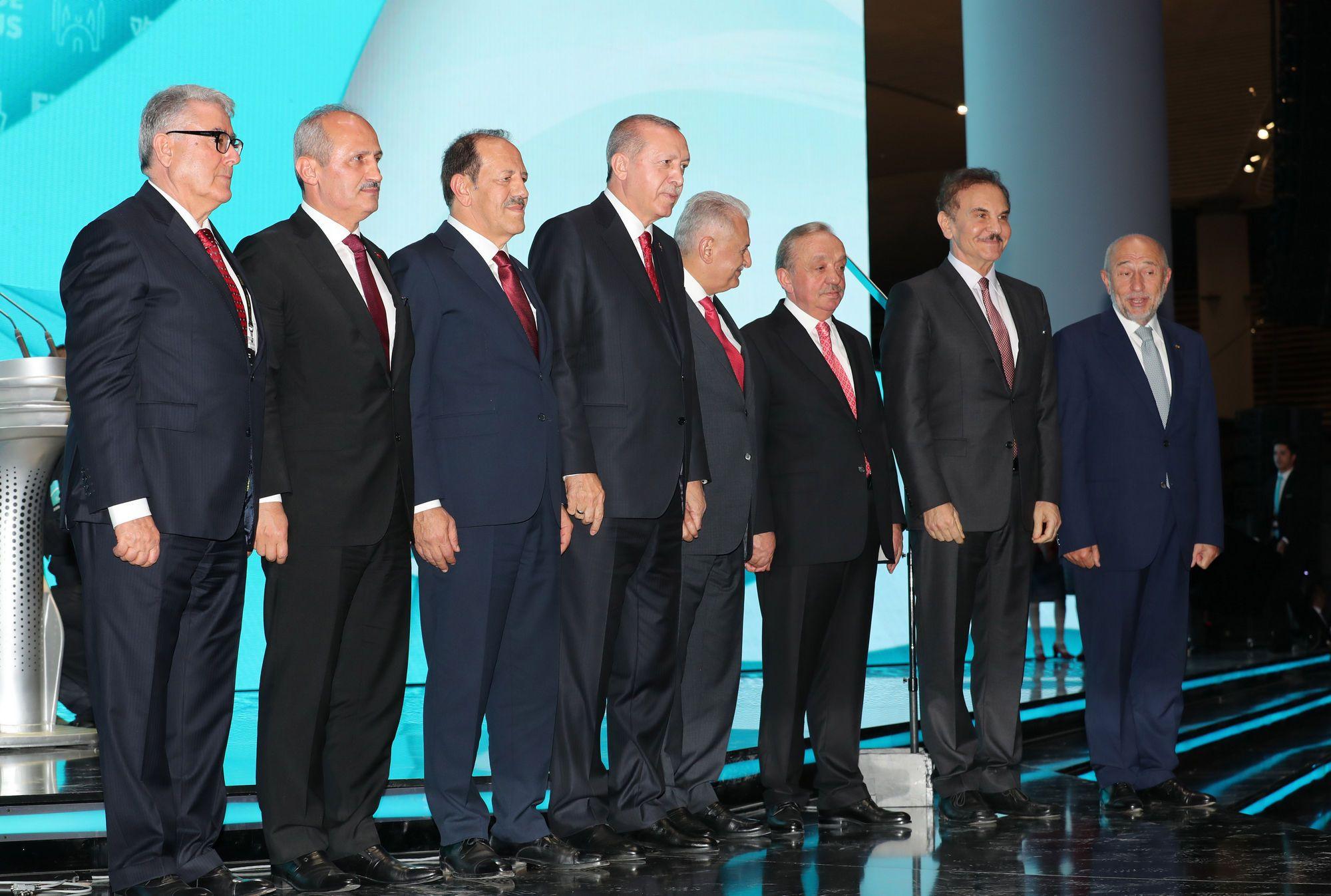
Turkish President Recep Tayyip Erdoğan with the heads of Turkey's largest construction companies at the inauguration of Istanbul International Airport. They include MAPA President Mehmet Nafız Günal (2nd from right), LİMAK President Nihat Özdemir (right), CENGİZ President İnșaat Mehmet Cengiz (3rd right), KALYON President Cemal Kalyoncu (3rd left) and KOLİN President Naci Koloğlu (left). Photo credit: Cem Öksüz - Anadolu Agency
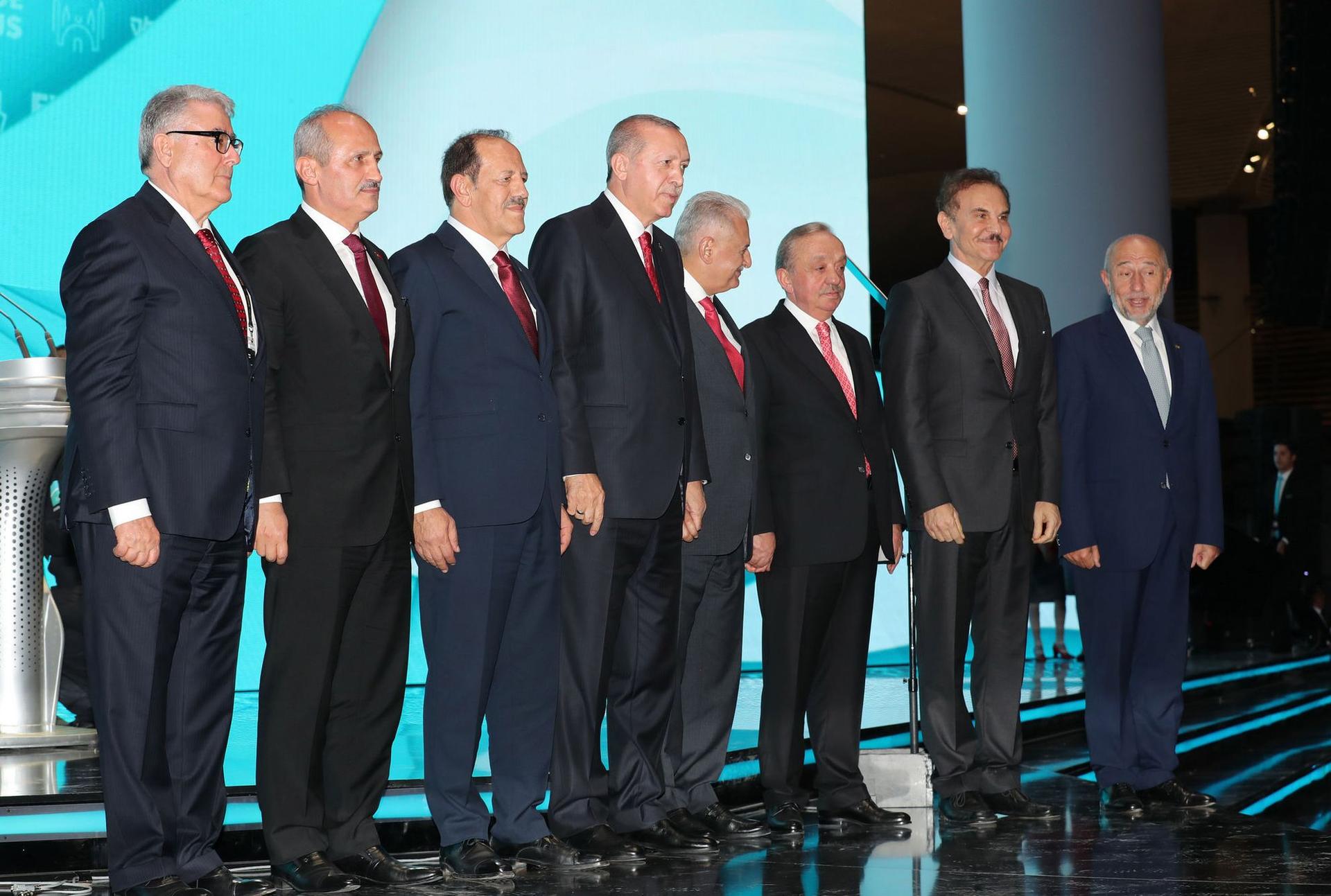
Turkish President Recep Tayyip Erdoğan with the heads of Turkey's largest construction companies at the inauguration of Istanbul International Airport. They include MAPA President Mehmet Nafız Günal (2nd from right), LİMAK President Nihat Özdemir (right), CENGİZ President İnșaat Mehmet Cengiz (3rd right), KALYON President Cemal Kalyoncu (3rd left) and KOLİN President Naci Koloğlu (left). Photo credit: Cem Öksüz - Anadolu Agency
PressOne recently analysed how Erdogan's loyal companies are building Romania's roads, especially since the "The Gang of Five" have entered the bids for public tenders: the five companies have either already won big projects or have participated and continue to participate in public tenders in Romania.
Now PressOne has documented the status of large construction companies close to the Erdogan regime in Turkey, but also the regional consequences of this complicity between political power and business. The editorial team also asked the European Commission for its official position.
Accusations of corruption against Turkish construction companies building in Romania
In its 20 years in power, the Justice and Development Party (AKP), founded by Erdogan himself, has made over a hundred amendments to public procurement laws and a bill tabled in March 2022 by 85 MPs of AKP proposed banning news that questioned the work of companies, under threat of a prison sentence of between 1 and 3 years. Although the bill does not explicitly refer to these particular companies, the opposition argued that the purpose of the bill was to protect the so-called "gang of five" companies.
Mulți ne citesc, puțini ne susțin. Fără ajutorul tău, nu putem continua să scriem astfel de articole. Cu doar 5 euro pe lună ne poți ajuta mai mult decât crezi și poți face diferența chiar acum!
Some of Turkey's big construction companies were involved in the December 2013 investigation into fraud, corruption and tax evasion, which stemmed from the purchase of a media group to serve as the government's mouthpiece. The Sabah newspaper, ATV and other media outlets owned by Turkuvaz Media, Turkey's main regime propaganda machine, were funded by commissions taken from businessmen loyal to the government in exchange for lucrative government contracts.
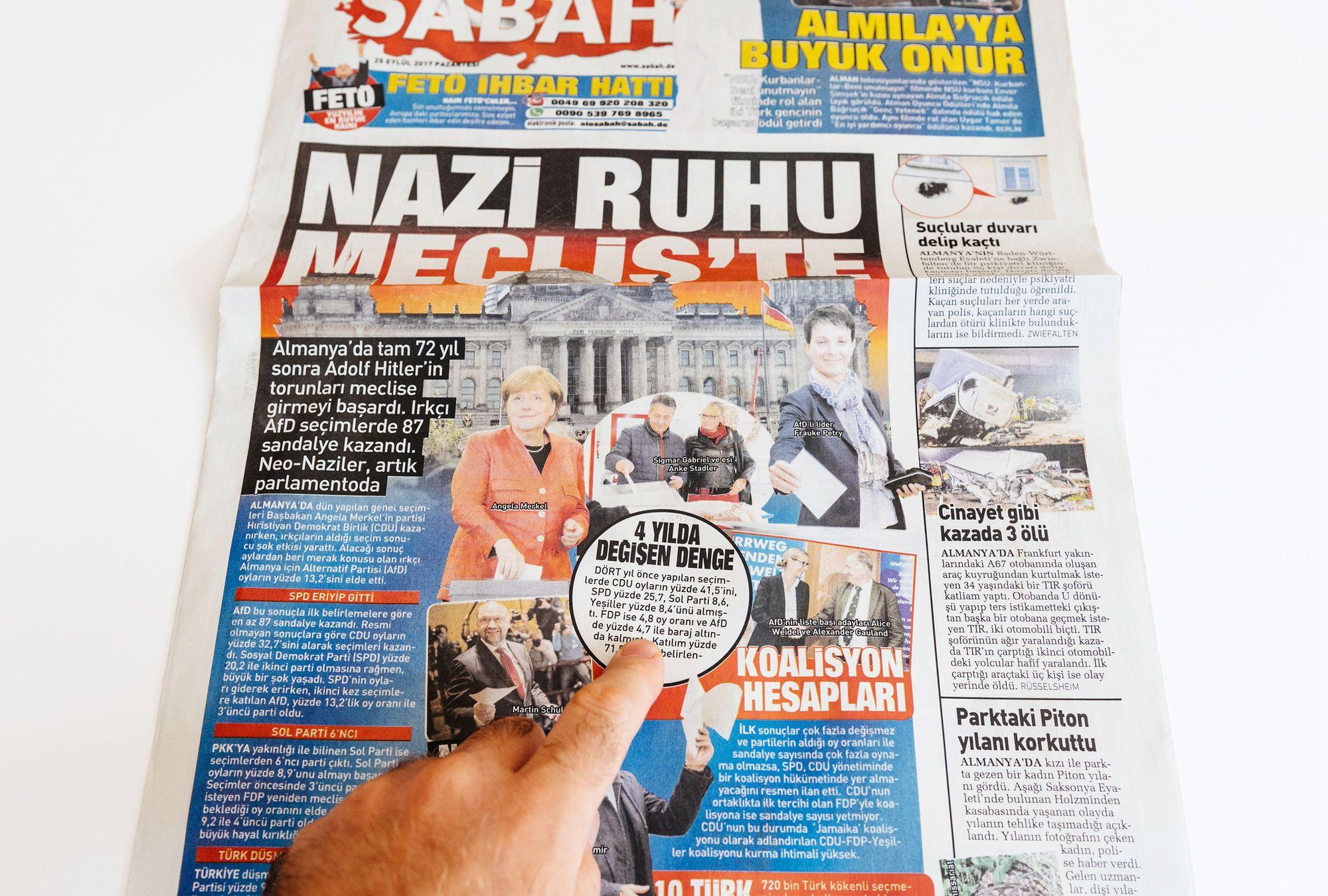
In regime-controlled publications, it is commonplace to describe the elections to the German parliament as "elections for parliament in the Nazi spirit". Photo: © Ifeelstock | Dreamstime.com
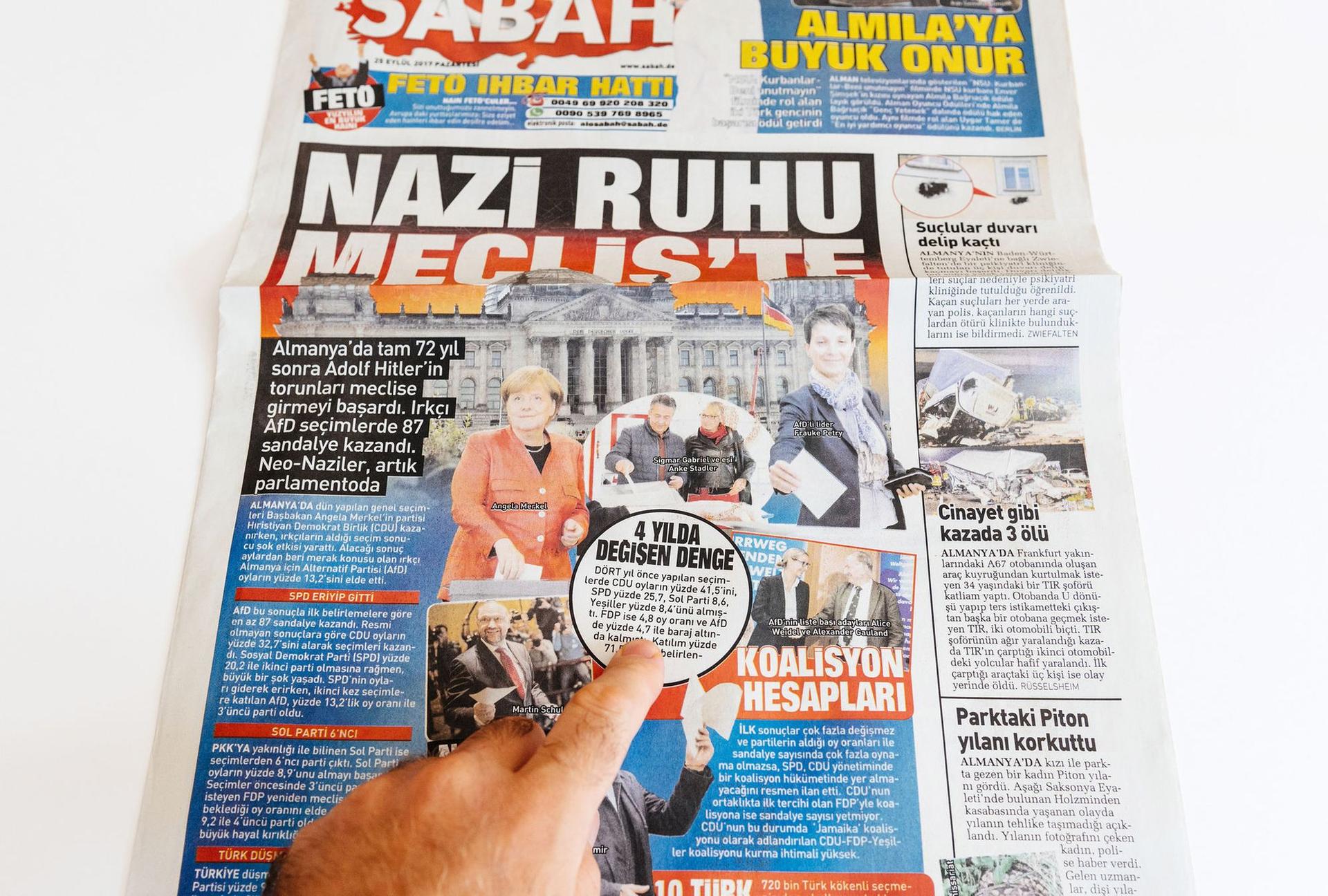
In regime-controlled publications, it is commonplace to describe the elections to the German parliament as "elections for parliament in the Nazi spirit". Photo: © Ifeelstock | Dreamstime.com
According to media investigations, the then Prime Minister, current President Recep Tayyip Erdoğan, had instructed Transport and Communications Minister Binali Yıldırım to organise a "fundraising drive" among several businessmen, to raise enough money to buy Turkuvaz Media (which included the daily Sabah and the TV station ATV). Yıldırım allegedly created a common fund from their contributions, promising them that they would win government tenders.
Phone conversations intercepted between the businessmen show that Mehmet Cengiz, Celal Koloğlu (CEO Kolin), Nihat Özdemir (founder of Limak and former president of the Turkish Football Association) and İbrahim Çeçen (founder of ICTAS) each transferred $100 million to the joint fund, while businessman Adnan Çebi (CEO Makyol) allegedly transferred $30 million and Hayrettin Özaltın (chairman of CA Ozaltin) transferred "only" $20 million for the purchase of Turkuvaz Media.
The investigation has been described in the press as the largest bribery and corruption investigation in the history of the Turkish Republic. Among the main suspects is President Recep Tayyip Erdoğan's son Bilal. But the Turkish government described the charges of bribery and corruption as "an attempted coup d'etat", launching a crackdown on police and judicial investigators by sacking and relocating hundreds of officials who initiated the investigation.
Predator in Robes: The Diocese of Iași and the Vatican Buried a Sexual Assault Committed by a Catholic Priest Against a Minor in Bacău, Failing to Alert Prosecutors
A Roman Catholic priest abused a 13-year-old girl in the parish where he served in Bacău County: the bishop of Iași knew about it, sent the case to the Vatican, and applied canonical sanctions, but did not notify the authorities, who only intervened later and sentenced him to prison.
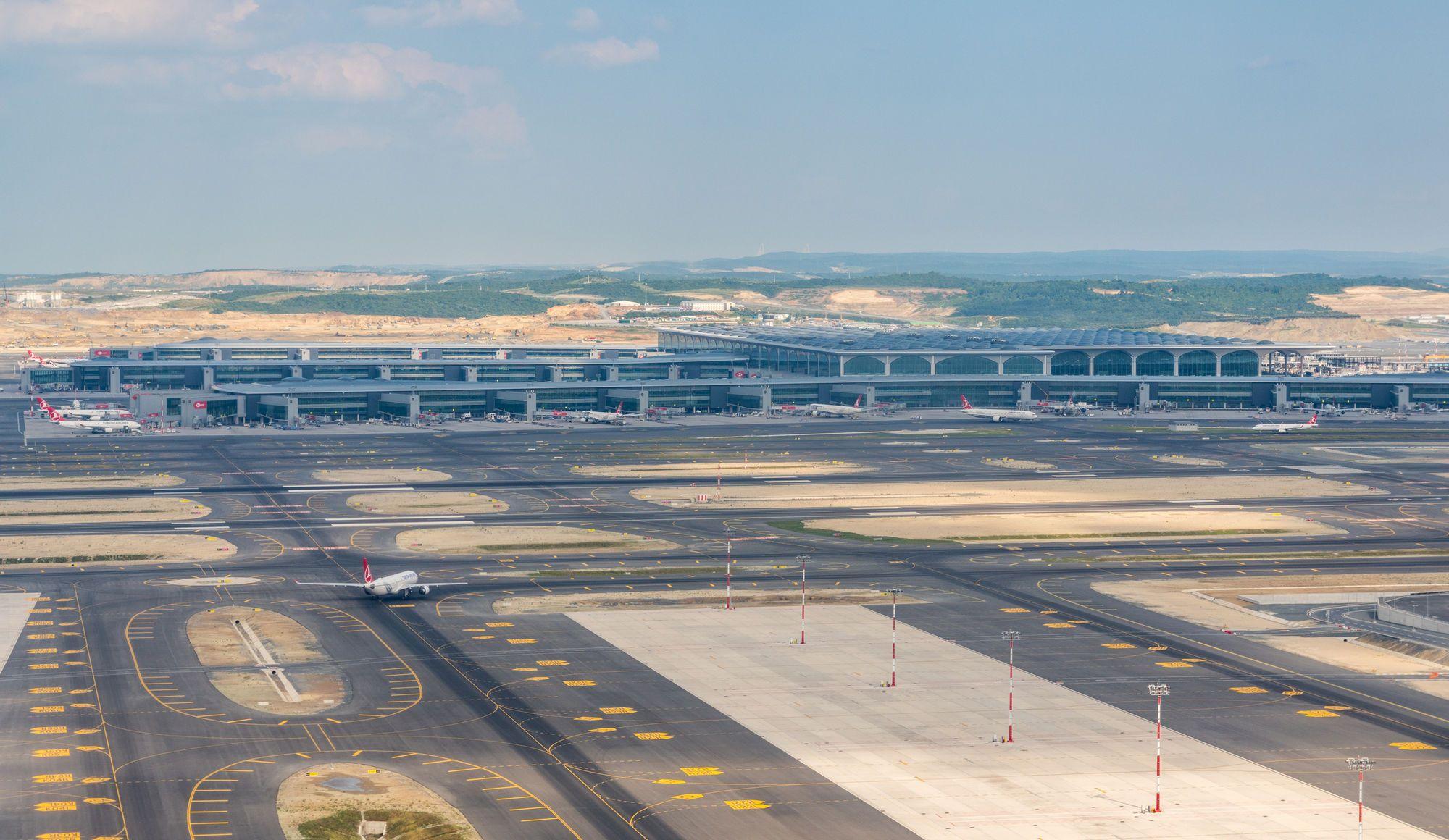
Istanbul's new international airport. Photo: © Steveheap | Dreamstime.com
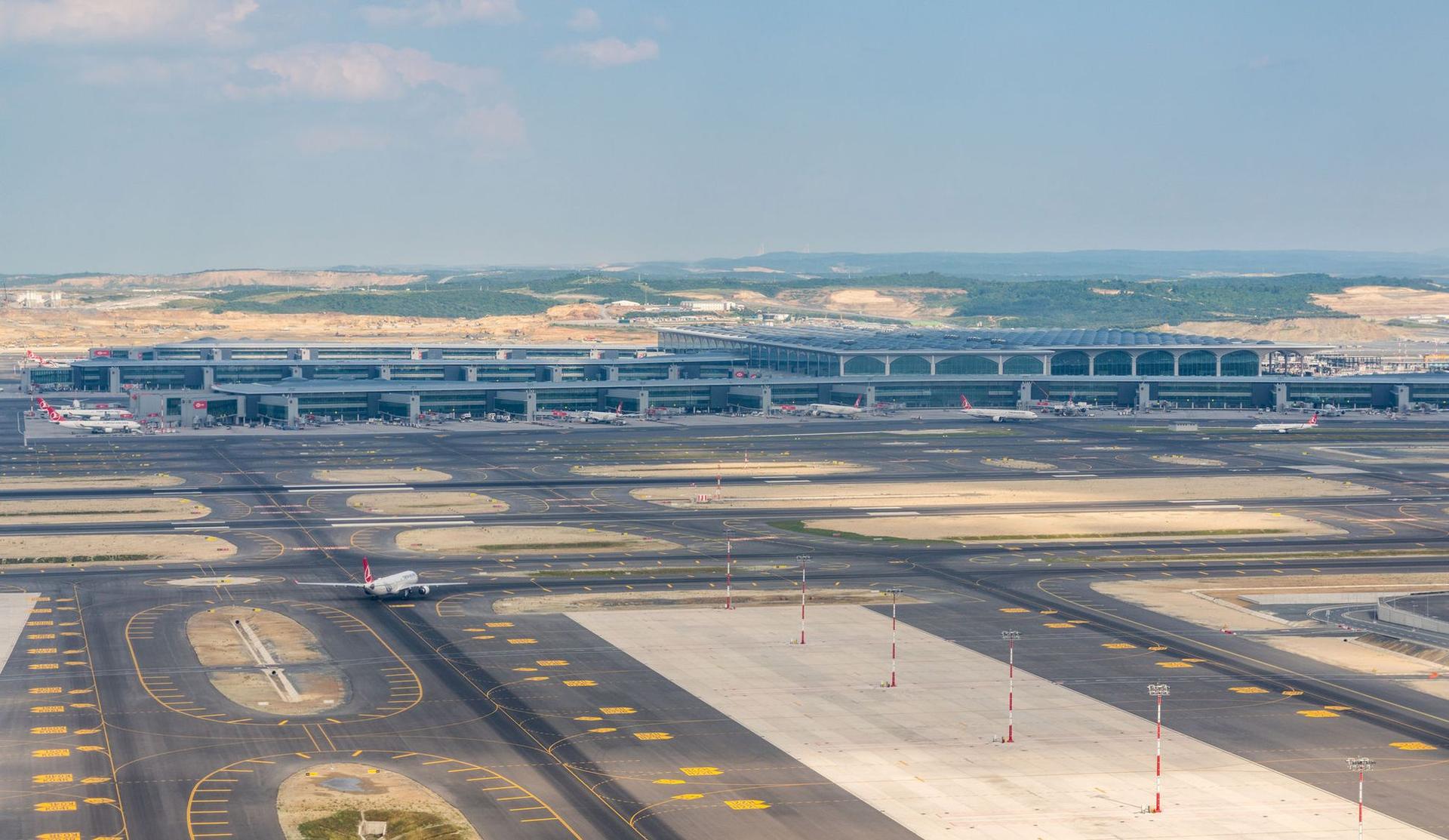
Istanbul's new international airport. Photo: © Steveheap | Dreamstime.com
Companies alleged to have participated in the scheme subsequently won major tenders for transport and energy projects, as well as for the new Istanbul airport. Cengiz-Kolin-Limak-Mapa-Kalyon, organised in a consortium, won in 2013 the tender for the construction of this giant infrastructure project, comparable in size to the island of Manhattan, which eventually cost $11 billion.
All the while, Erdogan has threatened, and not once, to break away from Europe and withdraw his country from the accession process, which has been ongoing for over two decades.
Un newsletter pentru cititori curioși și inteligenți.
Sunt curios
European Commission reports, devastating for Turkey
Latest European Commission report is critical of Erdogan's regime. Among other things, the Commission:
- "regrets that Turkey does not support sanctions outside the UN framework and notes that trade between Turkey and Russia has almost doubled since the beginning of the war in Ukraine"
- "expresses its deep concern about the continued hyper-concentration of power within the Turkish Presidency, without effective checks and balances, which has seriously eroded democratic institutions in the country"
- "expresses its concern about the malfunctioning of Turkey's market economy"
Turkey's accession to the EU is being negotiated in 35 different policy areas, called "negotiating chapters", which include the rule of law, democracy and respect for fundamental human rights. Of these, 16 have been opened for discussion and only one, on science and research (provisionally closed), has been resolved. The negotiations then stalled or reached a 'deadlock', as the European Council itself states.
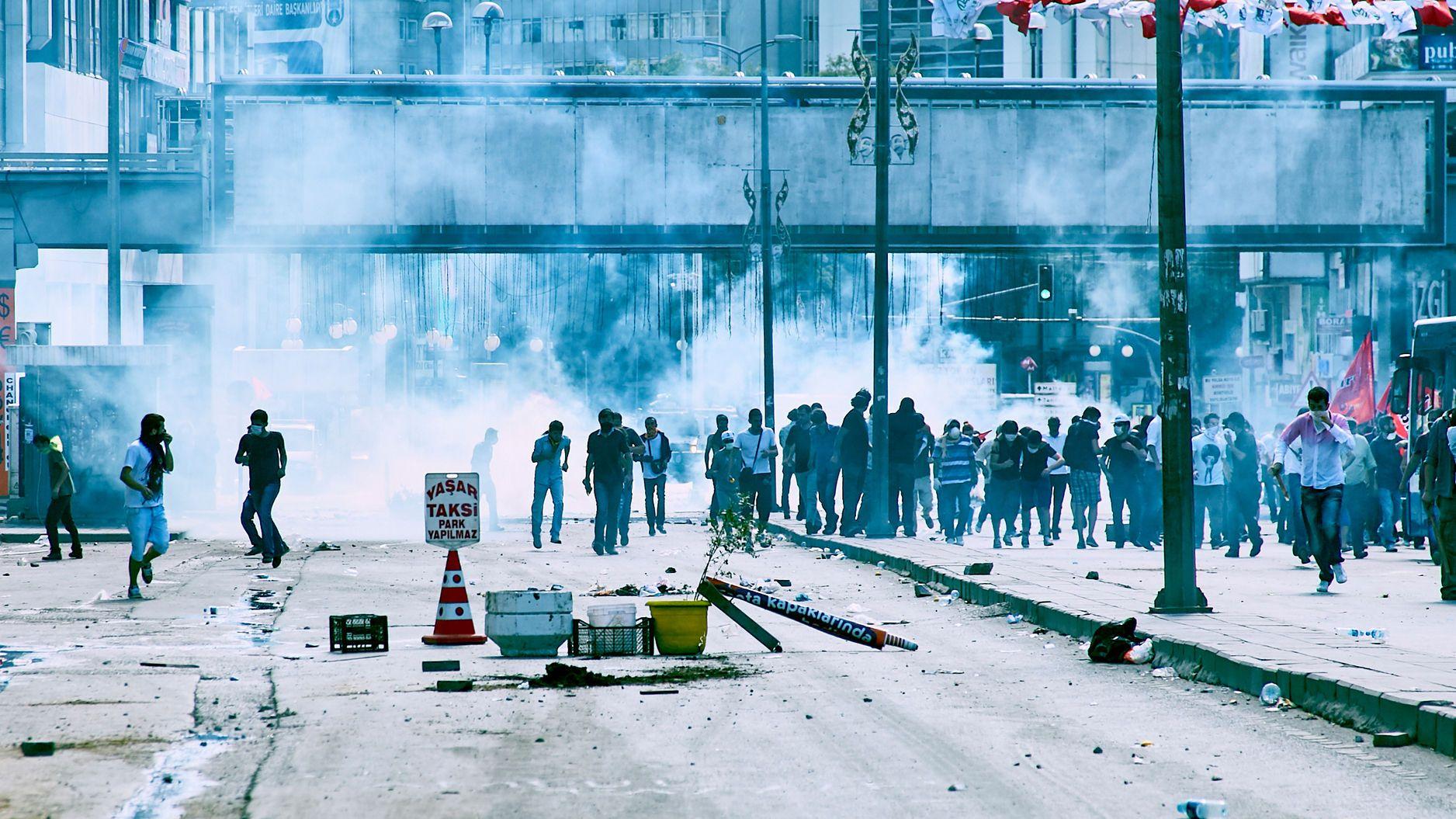
The brutal suppression of protest demonstrations in 2013 caused by plans to deforest Gezi Park was just one stage in the consolidation of President Erdogan's authoritarian regime © Cagkan Sayin | Dreamstime.com
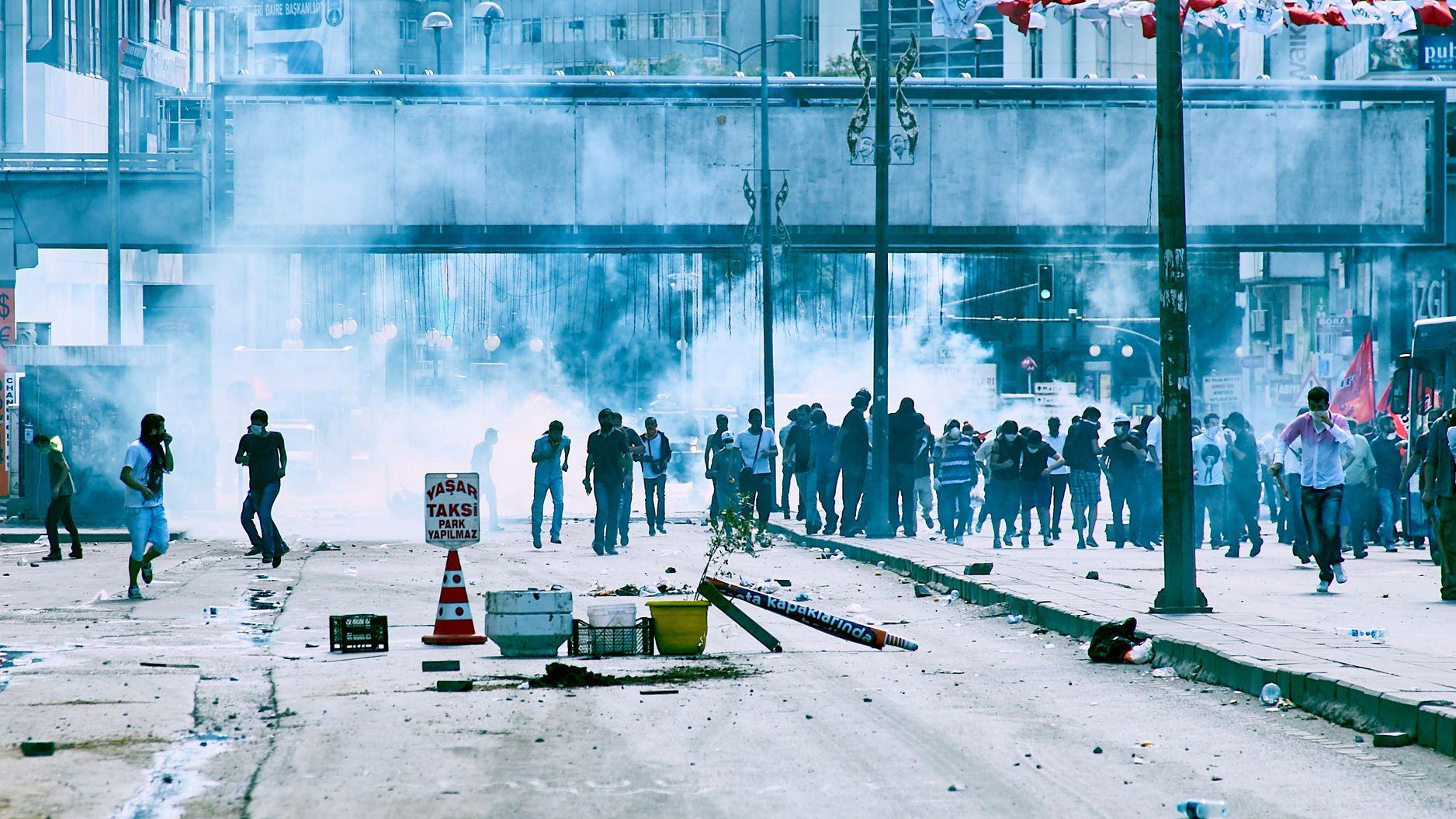
The brutal suppression of protest demonstrations in 2013 caused by plans to deforest Gezi Park was just one stage in the consolidation of President Erdogan's authoritarian regime © Cagkan Sayin | Dreamstime.com
"Turkey was granted EU candidate country status in December 1999. The EU and Turkey started accession negotiations in October 2005, but following the country's continued setbacks in terms of democracy, rule of law and fundamental rights, EU-Turkey accession negotiations have been stalled since June 2018."
While President Erdogan threatens to freeze the relations with the European Union, Turkey officially retains its status as a country in the process of joining the EU for 24 years, which opens up access to the European market.
Turkish contractors, $7.5 billion worth of contracts abroad. EU needs Turkey
At this point in November 2023, at least ten Turkish companies have won bids for large infrastructure projects in Romania, some of them of vital importance, such as the most difficult section of the A1 motorway or the 300 km pipeline that will transport natural gas from the Black Sea.
PressOne reported HERE that in just two years the number of Turkish construction firms building large infrastructure projects in Romania has increased at least fivefold and that they now cover more than 20% of the total value of road infrastructure works contracted by the Romanian state. This after just two years ago, in February 2021, the Romanian government was preparing to eliminate Turkey and China from public tenders for billion-euro infrastructure projects.
This year, in total, Turkish manufacturers won contracts worth at least $7.5 billion outside the country. In Romania, they won tenders worth at least €1.5 billion.
At home, companies protected by President Erdogan are bidding for public-private partnership contracts through exemptions from the Turkish Public Procurement Law, whose role since 2003 has been to bring Turkey in line with EU procurement standards. These are the same companies that have started to penetrate the European market, notably through projects in Romania, Poland and Hungary.
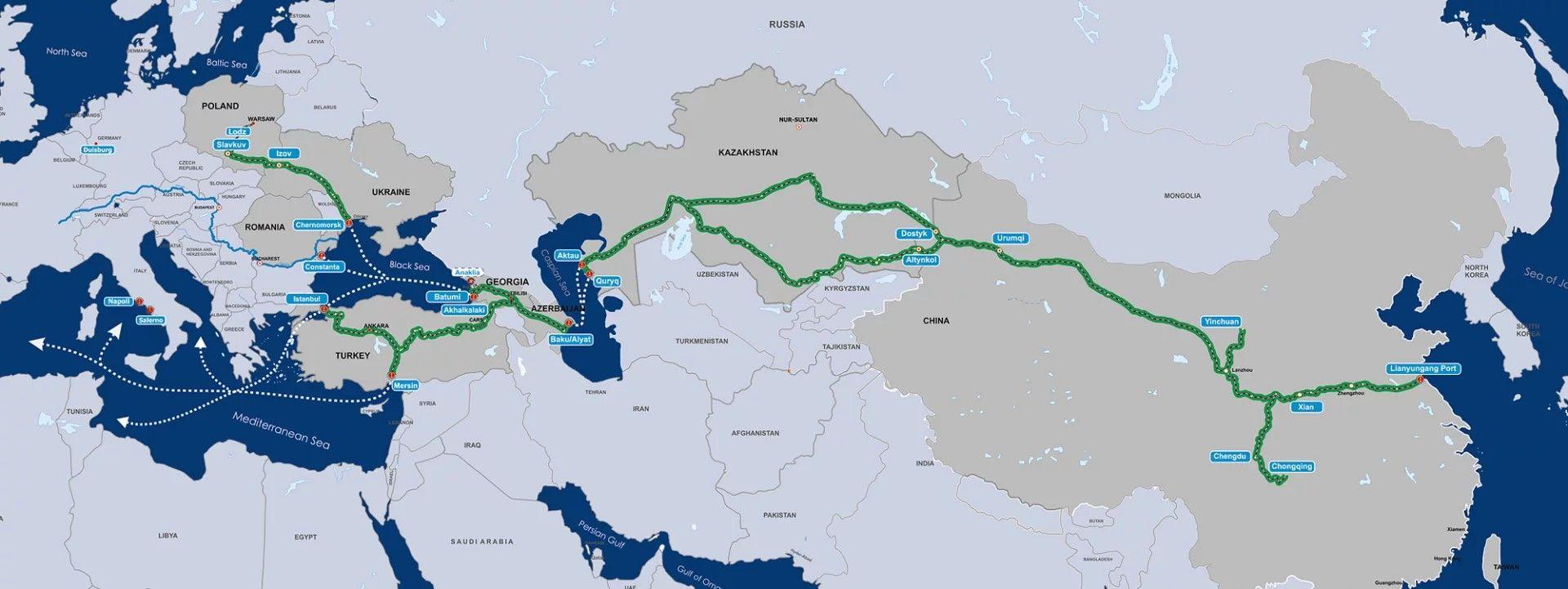
Turkey is centrally located at the forks of the Trans-Caspian route that starts in eastern China, crosses Kazakhstan, the Caspian Sea, Azerbaijan, Georgia, then continues to the heart of Europe. Photo source: Trans-Caspian International Transport Route
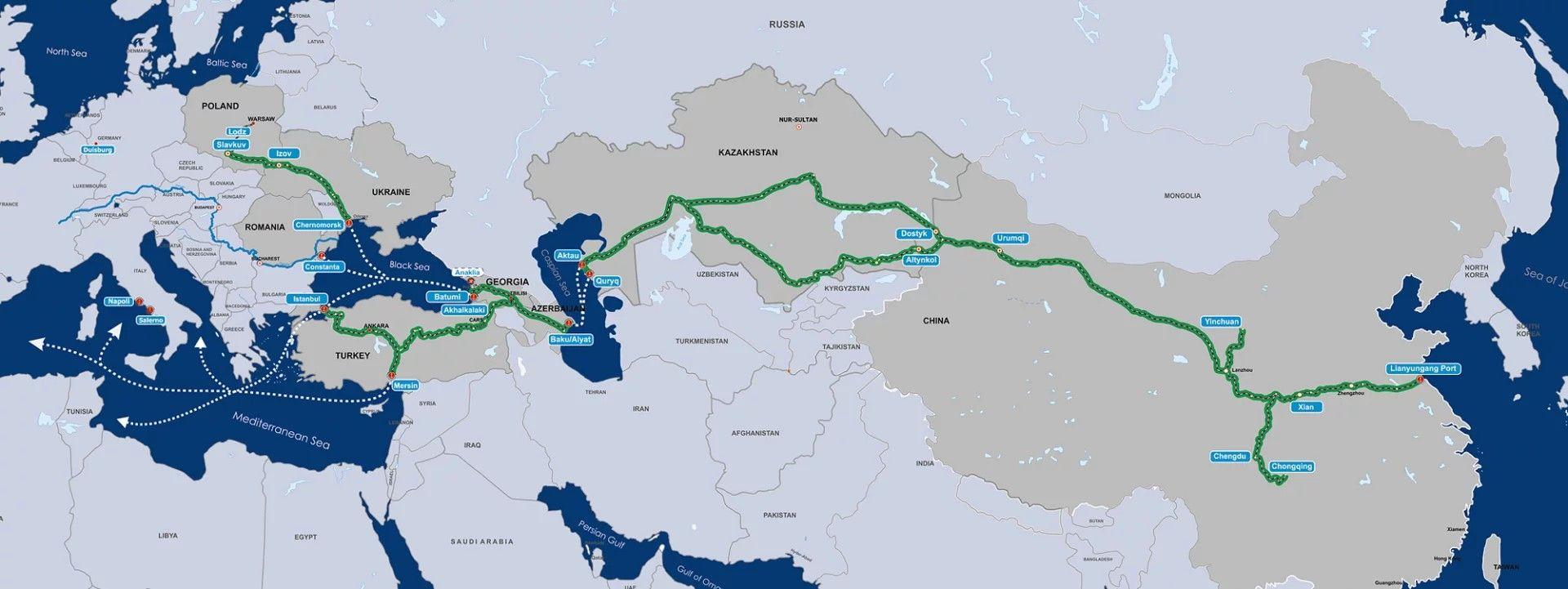
Turkey is centrally located at the forks of the Trans-Caspian route that starts in eastern China, crosses Kazakhstan, the Caspian Sea, Azerbaijan, Georgia, then continues to the heart of Europe. Photo source: Trans-Caspian International Transport Route
In the 2023 report, the EU states, under the chapter on "public procurement" (Turkish Public Procurement Law n. ed.) that in Turkey significant gaps still remain between local legislation and EU rules. The Turkish authorities have consistently resorted to direct negotiation or price monopolies in favour of domestic companies, the report adds.
Why does Turkey still retain the benefits of access to the European market (which allows these companies to build strategically important infrastructure projects in Romania) as a state in the process of joining the EU, even though it is not making progress in this regard?
"The EU looks realistically at the relationship with Turkey," security expert Stefan Popescu tells PressOne, "in the sense that it does not allow Turkey to completely swing the other way, towards Russia, China or Iran. The EU needs the Turkish market at the same time, because it is a very interesting market, there are 85 million consumers in Turkey."
Turkey needs Europe too, so Stefan Popescu speaks of a situation of interdependence. "Plus there are very important Turkish communities in the European Union, well represented, such as Germany, even France," says the security expert, who adds that one of the factors of President Erdogan's success in the May 2023 elections, which he won despite the devastating earthquake that exposed corruption in the system and caused 50,000 deaths, was the Turkish diaspora itself.
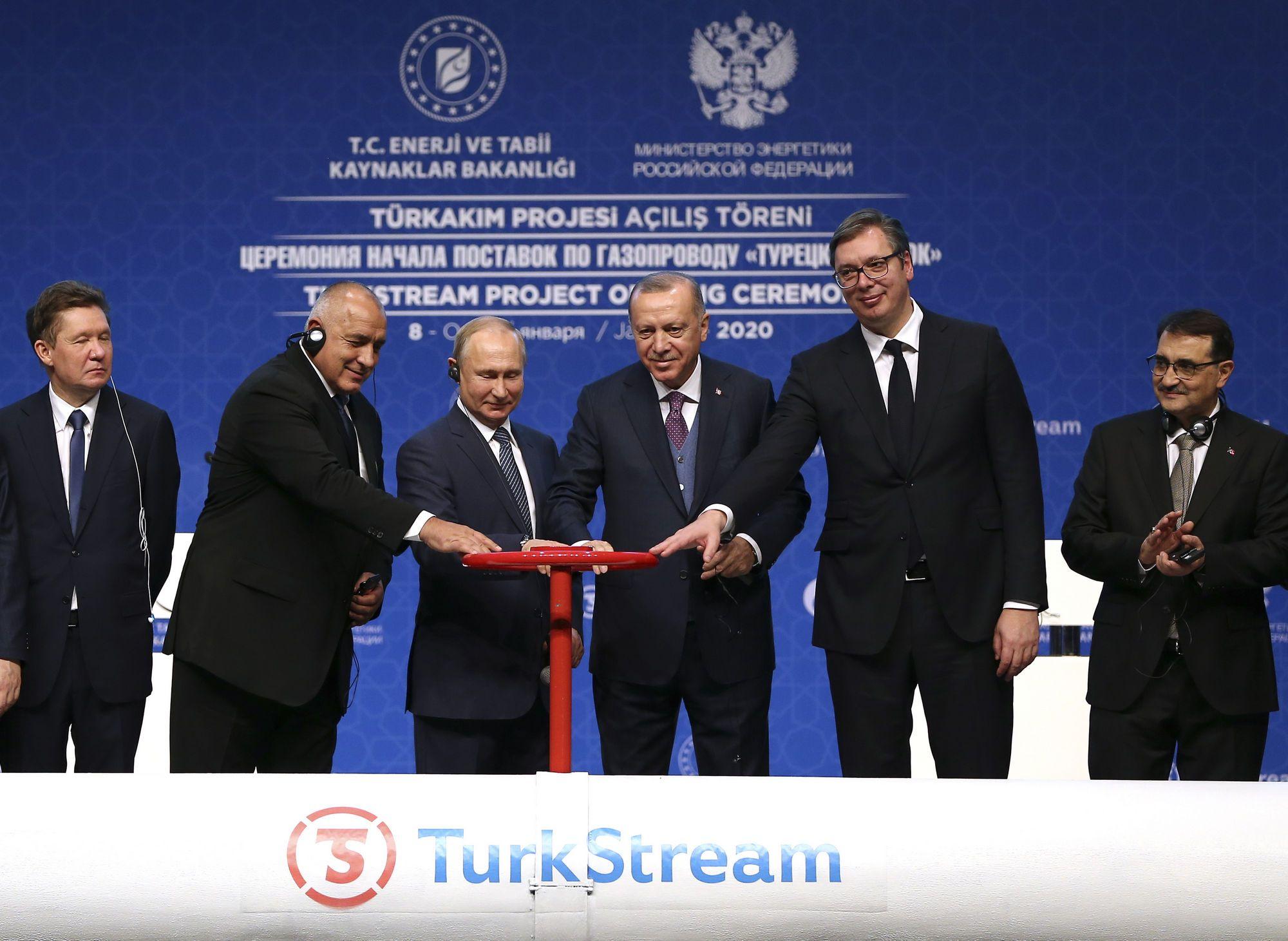
Erdogan's Turkey's double game surprises no one. The country is using its vital geostrategic position to develop projects with warring geopolitical blocs. Pictured, Turkey's president at the opening ceremony of the TurkStream natural gas transmission project in January 2020 with Putin and the presidents of Serbia and Bulgaria. Photo: Anadolu Agency
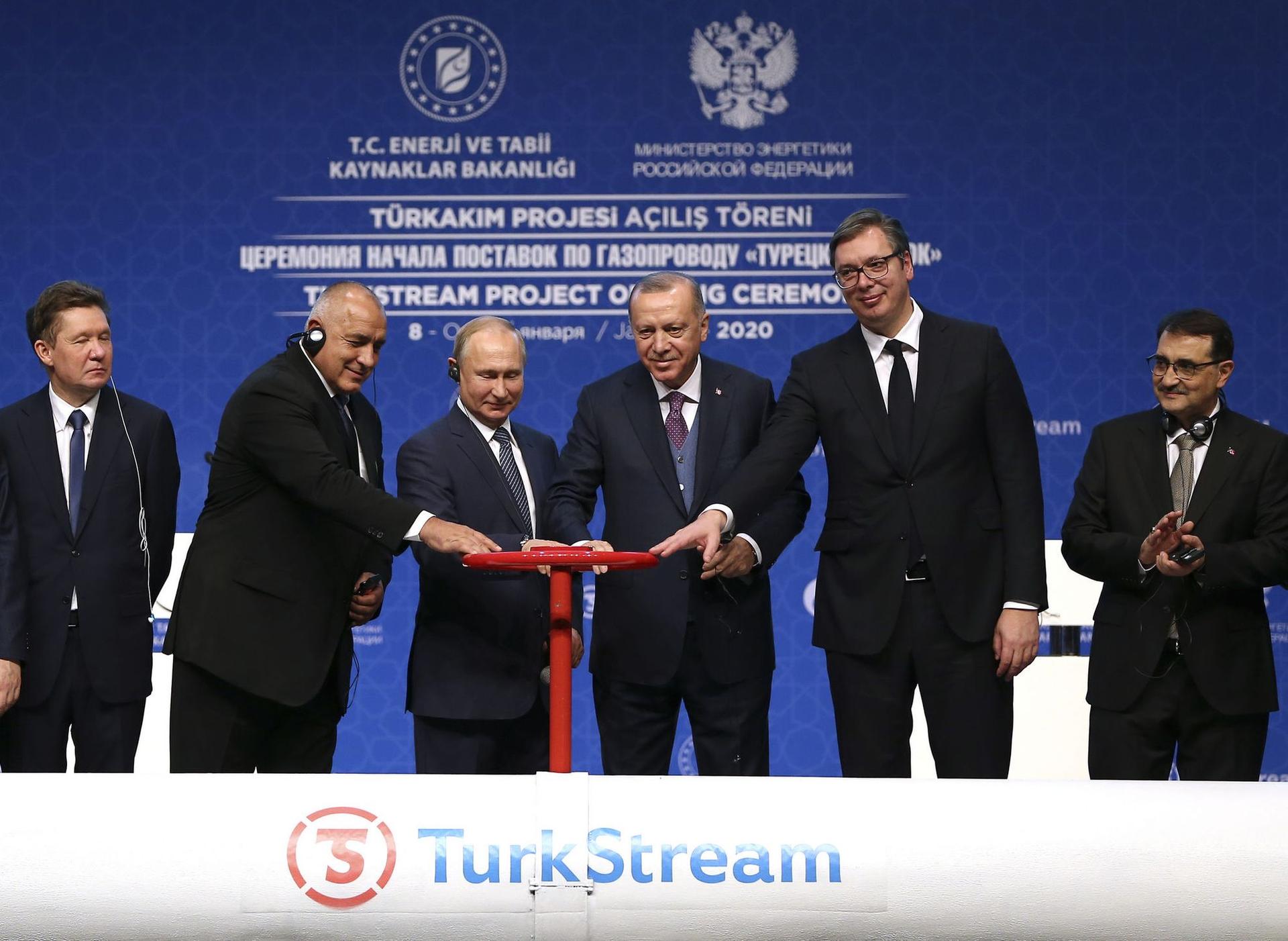
Erdogan's Turkey's double game surprises no one. The country is using its vital geostrategic position to develop projects with warring geopolitical blocs. Pictured, Turkey's president at the opening ceremony of the TurkStream natural gas transmission project in January 2020 with Putin and the presidents of Serbia and Bulgaria. Photo: Anadolu Agency
"We have to look realistically: Erdogan has used the accession conditions set by the European Union. Civilian control over the services, which were under military control. Of course, what did this allow Erdogan? To remove the Kemalists and put his own people in place, using the European Union's requirements," says Stefan Popescu.
A report by the CHP (Turkey's main party of position) claims that 50% of all tenders held in Turkey were won by these companies, which have been accused of corruption by the Turkish opposition several times over the years. Some sources, citing a World Bank report, claim that these companies have won the most public tenders in the world over the past decade.
How the European Commission responds to PressOne: "Turkey remains a key partner for the EU"
In September 2023, the Latvian government launched a tender for the Rail Baltica project linking the Baltic countries to the European rail network. Turkish companies IC İçtaș İnșaat and Doğuș İnșaat submitted the best bid in the tender. However, the Latvian government awarded the €3.7 billion tender to the ERB Rail Baltica JV consortium, set up by French, Italian and Polish companies.
The veto decision was taken on the advice of the Latvian State Security Service which recommended that Turkish companies be excluded from the tender. According to press reports, the reason is due to projects undertaken by the Turkish construction company IC İçtaș in Russia, which is building several bridges in St Petersburg, the Pulkovo International Airport terminal and the high-speed toll motorway between Moscow and St Petersburg, as well as working on the Akkuyu nuclear power plant project with the Russian construction company Titan-2.
Citing security reasons, the Latvian government excluded both companies from the tender. Both companies are currently bidding in Romania.
"Turkey's relationship with Russia is very complex. And here too there is a relationship of interdependence. I mean, Turkey depends on Russian energy, but also, of course, on the Russian market, including for the construction sector, for the agri-food sector, for the electrical engineering sector, for all light industry. But, at the same time, Russia depends on Turkey as an energy hub, but also as an intermediary platform with sanctions between Russia and the global economy, together with other countries, India, China, United Arab Emirates, and, of course, in the field of transport, too", says security expert Stefan Popescu at PressOne.
Against this background, at the request of the editorial office, the European Commission states that "in the 2023 EU enlargement package launched on 8 November, the E.C. underlined that Turkey remains a key partner for the European Union and a candidate country, but accession negotiations have been stalled since 2018, in line with the decision of the European Council. The country has not reversed the negative trend away from the European Union and has pursued accession-related reforms to a limited extent."
For Brussels, cooperation with Turkey in areas of common interest has continued "in key sectors such as counter-terrorism, the economy, energy, food security, migration and transport" and Turkey must "take decisive steps to significantly improve alignment with the EU's Common Foreign and Security Policy (CFSP) and to accelerate cooperation in preventing and detecting circumvention of restrictive measures."
Nor is its ambiguous relationship with Russia an obstacle to maintaining relations with the European Union: "For Turkey to remain in NATO, we tolerate its ambiguous position towards Russia and beyond. Turkey has both cooperative and competitive relations, and you see that it participates in formulas that go outside the North Atlantic Treaty Organisation and outside the West. The country has important strategic position. So the European Union needs Turkey, period", concludes security expert Stefan Popescu.
The European Commission is also 'closely monitoring' President Erdogan's 'Kanal Istanbul' project
The new Istanbul airport (opened to the public in April 2019, with an area of 76 million square meters and a capacity of 90 million passengers) was to become part of a series of mega-projects being built in Turkey ahead of the country's 100th anniversary in 2023, in a symbolism that links major infrastructure works to events in Turkey's past, in a manner similar to that of the Ottoman sultans, as security expert Stefan Popescu explains for PressOne.
President Erdogan is building his influence outside Turkey through these loyal companies - and in Europe he's just getting started. This has already been happening on other continents for a long time, he adds.
"These companies are taking part in big state projects abroad. Turkey is building its influence in Africa, for example. It's doing a lot of construction where Western companies can't reach because of security threats that would endanger their workers and the sensitivities of those establishments, which don't want to hear any more from Western powers, which they accuse of neo-colonialism.
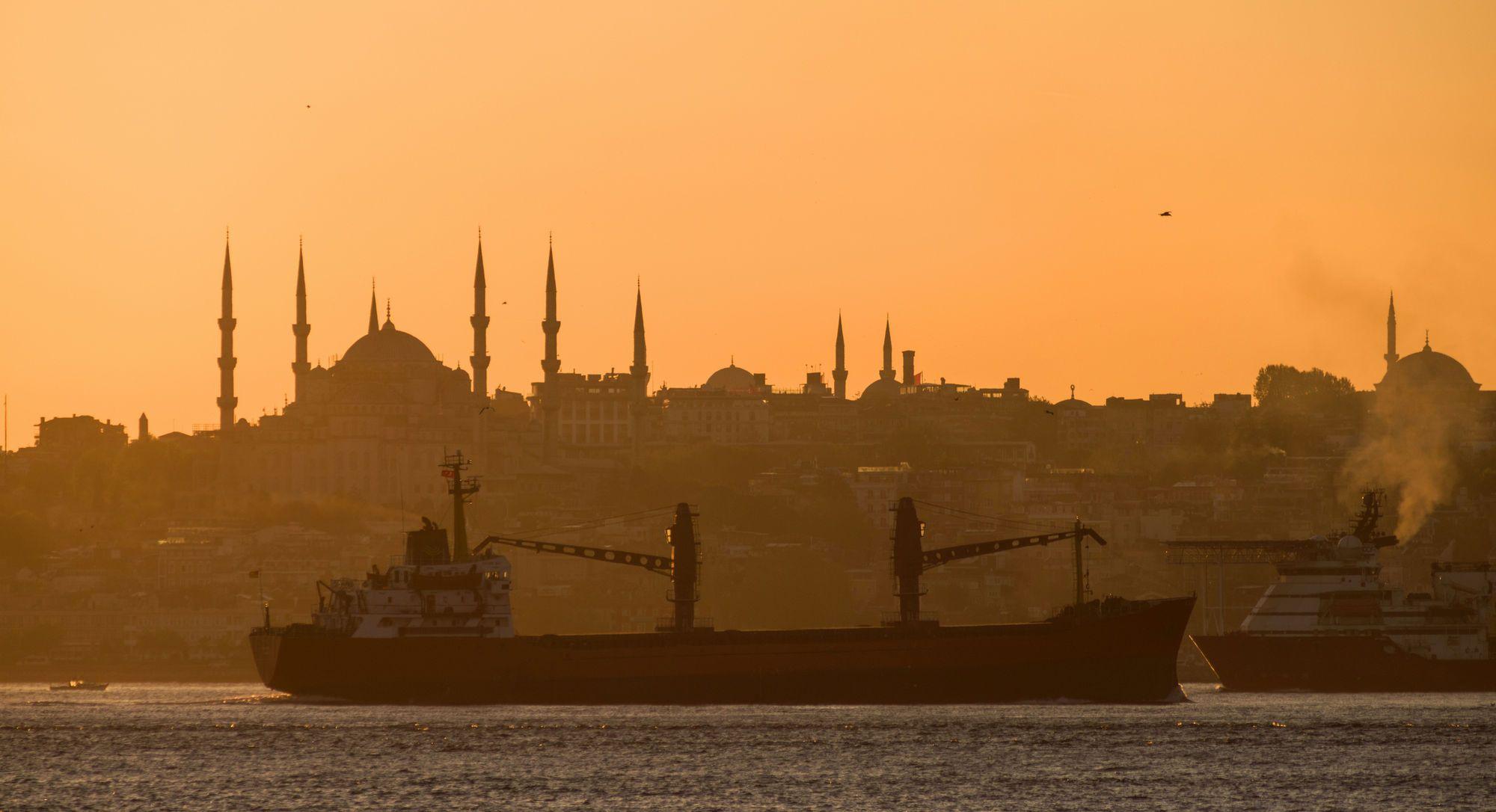
The congested Bosphorus-Dardanelles strait could soon be bypassed by a giant cargo canal. Photo: Volodymyr Pishchanyi | Dreamstime.com
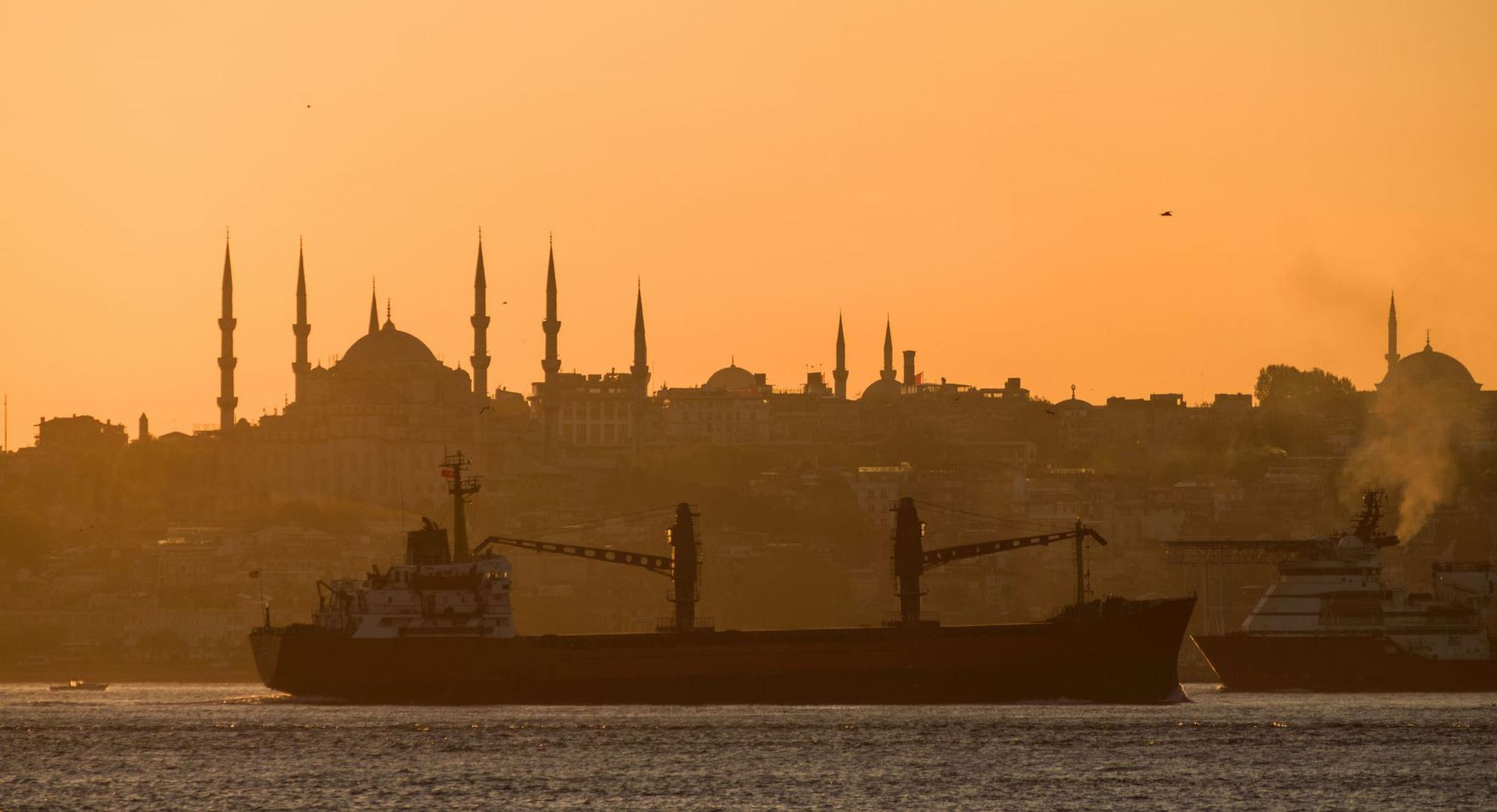
The congested Bosphorus-Dardanelles strait could soon be bypassed by a giant cargo canal. Photo: Volodymyr Pishchanyi | Dreamstime.com
Turkey has found an extraordinary niche. Because any regime also relies on a favourable economic environment, which it nurtures. Beyond the clientelistic side, there is also Turkey's desire to build its international influence through these infrastructure companies."
Cengiz, Limak, Kalyon, Kolin and Makyol are also the companies building President Erdogan's second mega-project: the 45 km Istanbul Canal, which will connect the Sea of Marmara and the Black Sea, parallel to the Bosphorus.
The project is considered one of the most destructive initiatives in Turkey from an ecological point of view, with many researchers and activists claiming that it will completely destroy the flora and fauna of Marmara (with its extremely fragile ecological balance).
Opponents of the project also argue that it will put Istanbul residents' access to drinking water at risk because it will affect two water resources in the area that cover a third of Istanbul's needs, the Sazlidere dam and Lake Terkos, and the salt water in the canal will also affect the groundwater table.
The canal also risks causing a geopolitical imbalance because will exist outside the Montreux Treaty of 1936, which gave Turkey sovereignty over the two straits (Bosphorus and Dardanelles) and the Sea of Marmara in peacetime with free access, while in wartime only to countries with access to the Black Sea. In other words, Erdogan will have a new canal at his disposal, which is outside international treaties, and which he can use freely in his own interest in a conflict situation.
"(The canal, ed.) will still be an instrument under Turkish sovereignty. And, of course, Turkey is also interested in increasing Turkey's transport capacity and importance in transport from the Black Sea to the Eastern Mediterranean and vice versa," security expert Stefan Popescu explains to PressOne.
In a reply sent to PressOne, the European Commission said it was "closely following Turkey's 'Kanal Istanbul' project to build a canal connecting the Black Sea and the Sea of Marmara. The 1936 Montreux Convention is an essential element in the context of the security and stability of the Black Sea. The EU is not a party to the Montreux Convention. It is, however, following the issue closely and calls on all States Parties to maintain their commitment to the Montreux Convention on Straits."
...nor can Romania afford to have bad relations with Turkey
"With Turkey, Romania has traditional relations, let's call them that, as Turkey is among Romania's most important partners outside the European economic space", says the security expert we spoke to.
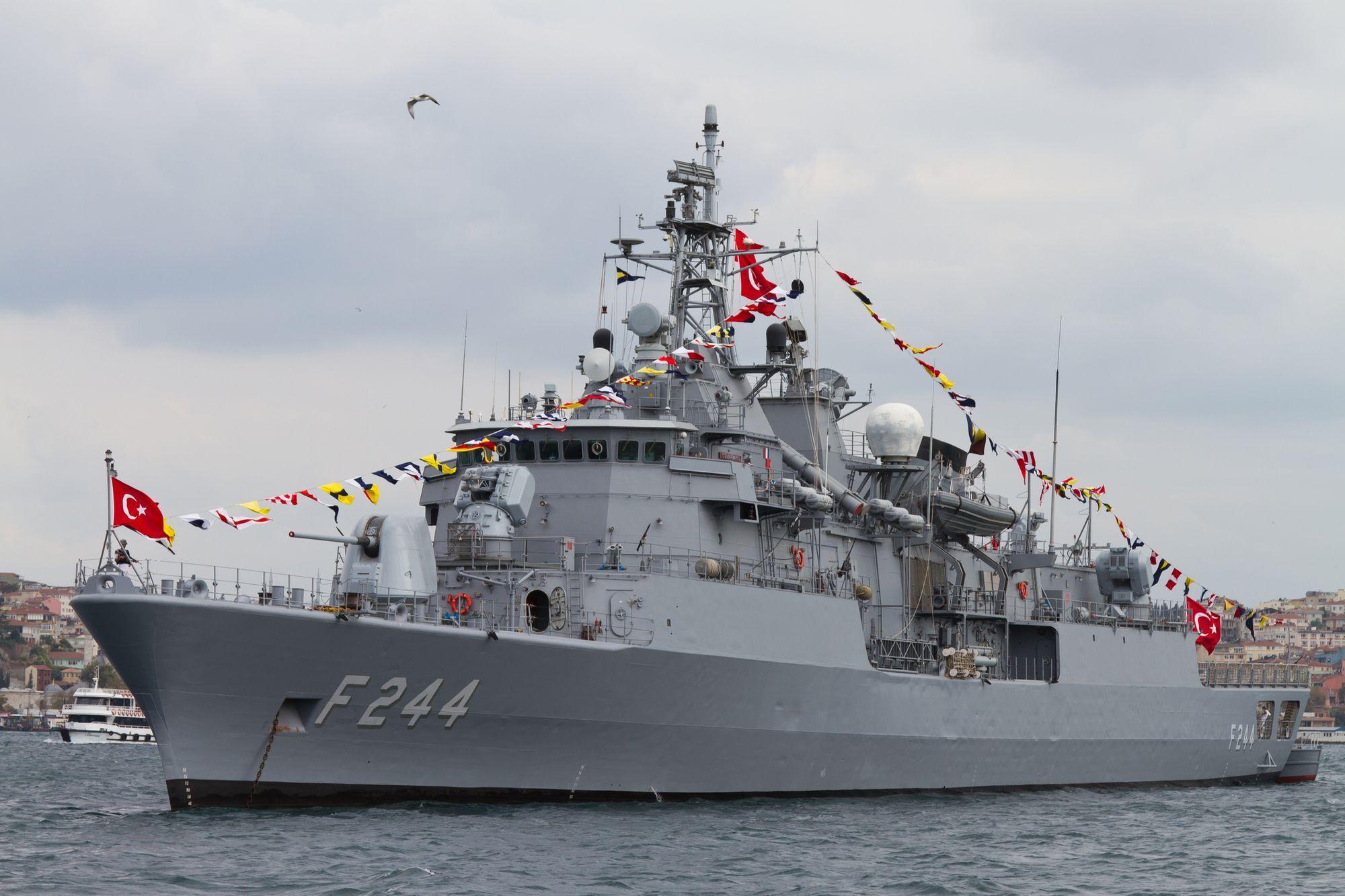
Turkey wants to do diplomacy with its naval force. As the war in Ukraine changes strategies in the Black Sea, Turkey's fleet will be essential to any post-war world. Photo: Evren Kalinbacak | Dreamstime.com
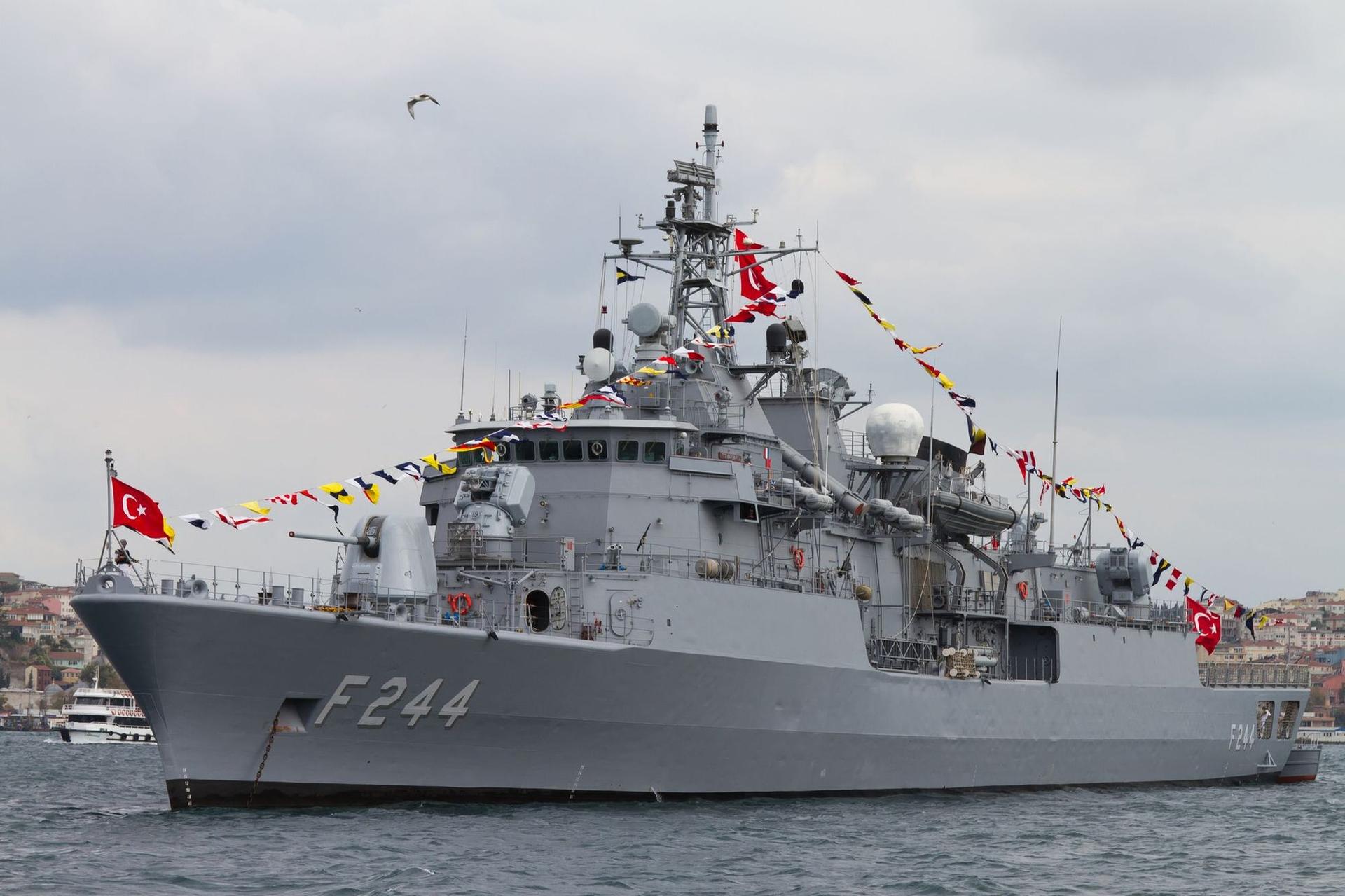
Turkey wants to do diplomacy with its naval force. As the war in Ukraine changes strategies in the Black Sea, Turkey's fleet will be essential to any post-war world. Photo: Evren Kalinbacak | Dreamstime.com
For Stefan Popescu, "Romania cannot afford to have bad relations with Turkey either." Unlike the EU as a whole, which may view cooperation with Ankara from an economic point of view, for Romania a good relationship with Turkey means above all a guarantee of security on the Black Sea.
"Look, please, on a map, at the situation in the Black Sea and the fact that Turkey, despite having this ambiguous policy towards Russia, at the same time contributes to a certain balance. Russia is not alone in the Black Sea and Turkey is the only one that has the capacity to balance this massive Russian presence centred on Crimea.
Romania, as a country bordering the Black Sea, has every interest to have a good relationship with Turkey and to be realistic. If Romania, let's say, were to be illustrated as the only European country that bans or introduces restrictions on Turkish companies, what would be the cost for Romania? The degradation of its relationship with Turkey? We cannot afford that."
In October 2023 Romania concluded a military agreement with Turkey. Details of the document signed in Ankara by the defence ministers of the two countries have not been made public.
Romania and Turkey have had a strategic partnership since 2011, but military cooperation outside NATO is a first.
This text is part of a series of articles proposed by TEFI, a cross-border editorial project developed by some of the most powerful editorial offices in Central and Eastern Europe: Gazeta Wyborcza (Poland), Magyar Jeti / 444 (Hungary), SME (Slovakia), Bellingcat (Netherlands), PressOne (Romania), united in a consortium financed by European funds and which aims to promote national and regional security issues.
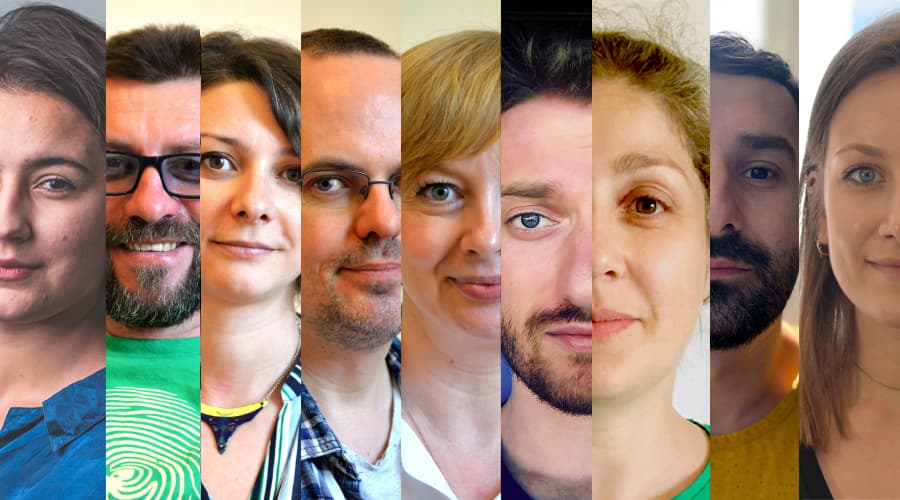
Avem nevoie de ajutorul tău!
Mulți ne citesc, puțini ne susțin. Asta e realitatea. Dar jurnalismul independent și de serviciu public nu se face cu aer, nici cu încurajări, și mai ales nici cu bani de la partide, politicieni sau industriile care creează dependență. Se face, în primul rând, cu bani de la cititori, adică de cei care sunt informați corect, cu mari eforturi, de puținii jurnaliști corecți care au mai rămas în România.
De aceea, este vital pentru noi să fim susținuți de cititorii noștri.
Dacă ne susții cu o sumă mică pe lună sau prin redirecționarea a 3.5% din impozitul tău pe venit, noi vom putea să-ți oferim în continuare jurnalism independent, onest, care merge în profunzime, să ne continuăm lupta contra corupției, plagiatelor, dezinformării, poluării, să facem reportaje imersive despre România reală și să scriem despre oamenii care o transformă în bine. Să dăm zgomotul la o parte și să-ți arătăm ce merită cu adevărat știut din ce se întâmplă în jur.
Ne poți ajuta chiar acum. Orice sumă contează, dar faptul că devii și rămâi abonat PressOne face toată diferența. Poți folosi direct caseta de mai jos sau accesa pagina Susține pentru alte modalități în care ne poți sprijini.
Vrei să ne ajuți? Orice sumă contează.
Share this

